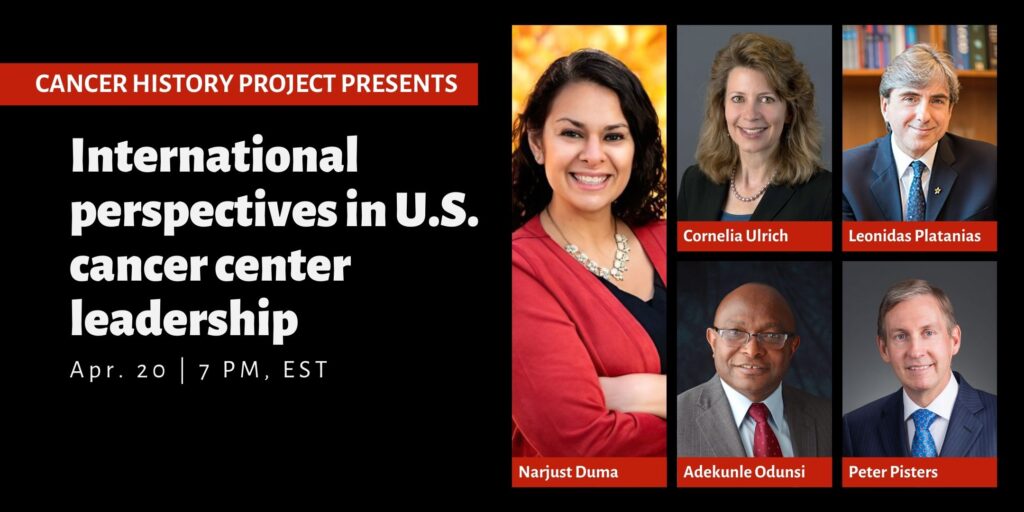Join the Cancer History Project April 20 at 7 p.m. EST for a panel moderated by Dr. Narjust Duma of Dana-Farber Cancer Institute. Four directors of NCI-designated cancer centers will discuss their unique perspectives as immigrants—and leaders in oncology. Topics will cover their unique pathways to leadership, diversity in medicine, and challenges faced by international medical graduates.
Moderator
Narjust Duma, MD, associate director, The Cancer Care Equity Program, thoracic oncologist, Lowe Center For Thoracic Oncology, Dana-Farber Cancer Institute; member of the faculty, Harvard Medical School
Panelists
- Adekunle Odunsi, MD, PhD, director, University of Chicago Medicine Comprehensive Cancer Center, dean for oncology, University of Chicago Biological Sciences Division, AbbVie Foundation Distinguished Service Professor of Obstetrics & Gynecology
- Peter WT Pisters, MD, president, The University of Texas MD Anderson Cancer Center
- Leonidas Platanias, MD, PhD, director, Robert H. Lurie Comprehensive Cancer Center of Northwestern University, Jesse, Sara, Andrew, Abigail, Benjamin and Elizabeth Lurie Professor of Oncology, Departments of Medicine and Biochemistry and Molecular Genetics
- Cornelia Ulrich, PhD, MS, Jon M. and Karen Huntsman Presidential Professor in Cancer Research, executive director, Comprehensive Cancer Center at Huntsman Cancer Institute, professor, Department of Population Health Sciences, University of Utah
Recent contribution


- A 45 Year Legacy of Research and Collaboration
By Yale Cancer Center | April 7, 2022
The first year that the National Institutes of Health funded a group of Yale scientists to explore links between viruses and cancer, U.S. troops were leaving Vietnam, Gerald Ford was president, and the movie “Jaws” broke box office records.
The scientists wrote their 400-page proposal on typewriters and made 20 paper copies on Xerox machines. They put it all into a big box and sent it through the U.S. mail. It was 1975.
Their research pleased the NIH so much that the agency renewed the grant—eight times over 45 years. Titled “Molecular Basis of Cancer Virus Replication, Transformation, and Innate Defense,” it became the longest-running program project grant at Yale, and the third longest at the NIH. It brought more than $50 million to Yale labs and resulted in nearly 500 publications, many of them groundbreaking. The grant helped launch the careers of hundreds of scientists who trained under its leadership, including several on the Yale faculty.
This column features the latest posts to the Cancer History Project by our growing list of contributors.
The Cancer History Project is a free, web-based, collaborative resource intended to mark the 50th anniversary of the National Cancer Act and designed to continue in perpetuity. The objective is to assemble a robust collection of historical documents and make them freely available.
Access to the Cancer History Project is open to the public at CancerHistoryProject.com. You can also follow us on Twitter at @CancerHistProj, or follow our podcast.
Is your institution a contributor to the Cancer History Project? Eligible institutions include cancer centers, advocacy groups, professional societies, pharmaceutical companies, and key organizations in oncology.
To apply to become a contributor, please contact admin@cancerhistoryproject.com.












